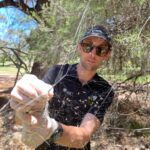Projects range in diversity from philosophical ethology to atomic collisions research
Curtin University has been awarded $10 million in funding from the Federal Government’s Australian Research Council (ARC).
The ARC funding will make a significant contribution to Curtin University’s research effort and will support 25 research projects across the University.
Professor Graeme Wright, Curtin University’s Deputy Vice-Chancellor for Research said the ARC Discovery Program was a premier Australian funding scheme and Curtin was very proud to receive such a boost in funding for key research projects.
“Seventeen grants were awarded under the Discovery Project’s scheme, six under the Discovery Early Career Researcher Award scheme and two under the Linkage Infrastructure, Equipment and Facilities scheme,” Professor Wright said.
“The diversity of Curtin research supported is particularly pleasing with three grants being awarded to geosciences and four to humanities based researchers.”
One project that received funding aims to develop a new field of inquiry, philosophical ethology.
Dr Matthew Chrulew, Research Fellow with the Centre for Culture and Technology said that new insights into animal culture, tool-use and cognition had unsettled the traditional view of animals as merely reactive machines.
“At a time of dwindling habitats and biodiversity loss, this project aims to conduct a historical, conceptual and epistemological study of the sciences of animal behaviour. Its goal is to develop new insight into changing human and natural systems, in dialogue with contemporary discussions in the environmental humanities and animal studies,” Dr Chrulew said.
Research applications into the quantum collision theory for astrophysics, fusion energy and hadron therapy was also awarded a grant from the ARC.
John Curtin Distinguished Professor Igor Bray, Department of Physics and Astronomy said the project would allow researchers to apply their calculations to diverse fields ranging from astrophysics and fusion energy through to medical imaging and therapy.
“Collisions on the atomic scale go on all around us. Many applications benefit from their quantitative understanding, however they are very difficult to calculate,” Professor Bray said.
“The Theoretical Physics group at Curtin have recently found ways to overcome these difficulties and this grant will allow our research findings to be applied further afield.”
A grant awarded to John Curtin Distinguished Professor Anna Haebich, School of Media, Culture and Creative Arts; Dr Elfie Shiosaki, Centre for Human Rights Education; and a team of researchers working with Noongar leaders will develop the first account of Noongar letter writing stored in the Western Australian Government archives.
“Looking at the period from 1860 to 1960, the project’s significance lies in revealing hidden activism in the archives and restoring silenced Noongar stories to the documents,” Professor Haebich said.
“Working closely with the Noongar leaders to bring the letters to the community and the writers’ families, we hope to transform this writing into invaluable cultural heritage for the emerging Noongar nation.”
Professor Chun-Zhu Li, Dr Dehua Dong and Professor Gordon Parkinson from the Fuels and Energy Technology Institute, received a grant to look at CO2 utilisation for energy storage.
“CO2 does not always have to be a problem,” Professor Li said.
“This project aims to develop a novel technology that can convert CO2 into useful products while storing intermittent renewable energy as green stable chemical energy.
“If successful, this technology could make a significant contribution to increasing our use of renewable energy and reducing our CO2 emissions,” Professor Li said.
Funding was also granted through the ARC Linkage Infrastructure, Equipment and Facilities (LIEF) scheme which included an allocation of $1 million to a project to further develop the Murchison Widefield Array project which is recognised as a key enabling initiative towards the Square Kilometre Array.
“The continuing support from the ARC will enable the next stage of development and ensure that we remain at the leading edge of the global SKA project,” Professor Wright said.
“The LIEF scheme provides funding for research infrastructure, equipment and facilities and fosters collaboration through its support of the cooperative use of international or national research capability and facilities.”
Professor Wright said the increased level of ARC funding reflected a commitment to high quality and high impact research.
“Curtin has recently been recognised in the Academic Ranking of World Universities as one of the most rapidly emerging research institutions internationally and the level of funding reflects our position in the global research environment.”
ARC funding for Curtin’s projects will commence in July 2016.
Further information, including project summaries and statistics, can also be found on the ARC website, in ARC RMS Funding Announcements and in the media announcement kit.


